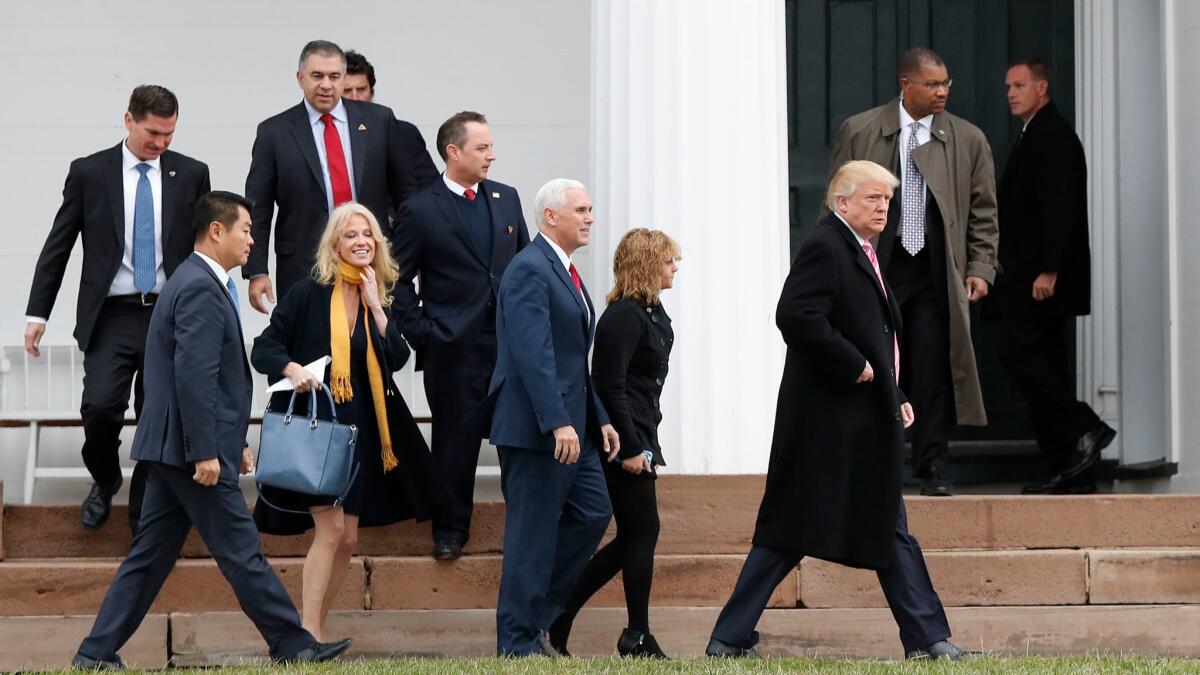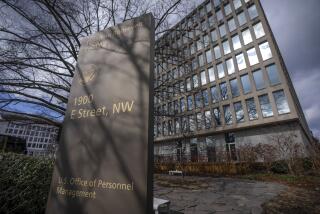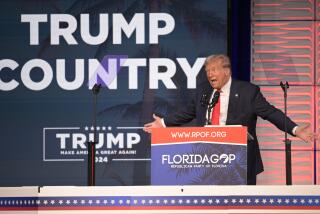Op-Ed: Trump’s attempt to ‘drain the swamp’ will make matters worse in Washington

As a presidential candidate, Donald Trump pledged to oust special interests from government by promising to “drain the swamp” in Washington. These three words may make for a clever chant. But Trump’s key proposals — hiring freezes for the federal workforce, term limits for Congress and a few cosmetic lobbying bans —are to ending corruption what bloodletting and leeches are to healing the sick. They won’t work, and they only make matters worse.
In the Trump narrative, Washington is broken because of career politicians and lobbyists, and if we remove those players, surely we will remove the corruption. Trump himself supposedly proves this fantasy: He ran a bare-bones campaign as an outsider free from special interests, with virtually no experienced policy advisers.
Yet upon winning, Trump immediately turned to the very same lobbyists he had attacked. When confronted on “60 Minutes” about his decision to rely on lobbyists in his transition efforts, Trump acknowledged a reality of Washington policymaking: “That’s the only people you have down there.” And when he then tried to change course by prohibiting registered lobbyists from helping out, some of the lobbyists simply deregistered. This highlights the comic futility and worthlessness of such bans: They’re very easy to get around.
Just plain common sense isn’t enough to make good laws. Keeping experts on congressional staffs isn’t a waste of taxpayer money.
Trump’s vision for government reform runs up against three basic truths about U.S. policymaking. One is that our government creates a large number of very complex laws and policies because we live in a complex society. A second is that lots of powerful groups are affected by these policies, and now more than ever, those groups are well-mobilized to shape the design of government policy. The third is that if government doesn’t have resources of its own to develop policies, private groups with narrow interests — businesses above all — will happily do it themselves.
The way these truths play themselves out is clear at the state level, where being a lawmaker is often a part-time job. The less professionalized a legislature is, the more likely it will outsource the drafting of bills to business interests and the more corporate-sourced bills wind up enacted into law. And wherever there are term limits, lobbyists have even more influence because they’re often the only ones around with any real experience moving bills through the legislature.
According to the National Conference of State Legislatures, in 16 states, lawmakers report spending about half their time working on legislative issues and are paid less than $20,000 on average. But those states that do not spend much on their legislatures pass many more bills that favor narrow business interests, such as tax cuts, that wind up draining state coffers over the long run.
Since the 1980s, Washington has steadily de-invested in its own professional capacity, leaving members of Congress with fewer and less-experienced staff than they had in the past. Over the last several years, staff salaries have actually declined, while turnover remains high. From 2006 to 2016, the median term for a Senate chief of staff was 2.5 years, and for a House chief of staff, 2.8 years. The problem suggests its own solution: Expand policy resources in government, including paying to retain and attract experienced and knowledgeable people.
Washington requires lawmakers, legislative staff and bureaucrats who have the time and know-how to actually think through policy on their own. This means countering simplistic “drain the swamp” ideas. Just plain common sense isn’t enough to make good laws. Keeping experts on congressional staffs isn’t a waste of taxpayer money. And ordinary citizens — especially those who do not need a government paycheck, like Donald Trump — won’t do a better job or be more likely to resist special interests than those with experience and expertise.
It is true that “citizen legislatures” and “non-professional politicians” cost less in direct terms. And convincing voters that their legislators and administrative agencies need more resources will be difficult, especially in an era when public officials are viewed with distrust and disdain. But the evidence is increasingly clear: Disproportionate special interest and lobbyist influence comes from the simple fact that on many issues, these lobbyists are the only ones investing in crucial policy resources.
Eventually, medical science recognized that bloodletting and leeches were counterproductive. Instead, we came to understand that the body had a natural immune system, and the key to curing illness was to strengthen — not weaken — those responses. Experienced and informed public officials are the immune system of representative democracy, the individuals best-positioned to resist the enervating influence of narrow special and corporate interests. We need more, not fewer, of them.
Lee Drutman is a senior fellow in the political reform program at New America and the author of “The Business of America is Lobbying.” Alexander Hertel-Fernandez is an assistant professor of international and public affairs at Columbia University and the author of the forthcoming book “Politics at Work.”
Follow the Opinion section on Twitter @latimesopinion and Facebook
MORE FROM OPINION
Can a holiday to honor Native Americans help heal a history of oppression?
Trump admits he has a kleptocracy problem, but so far, he hasn’t got a solution
More to Read
A cure for the common opinion
Get thought-provoking perspectives with our weekly newsletter.
You may occasionally receive promotional content from the Los Angeles Times.






